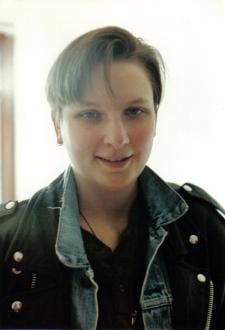The founding editor of Winnipeg’s 15-year-old gay and lesbian newspaper — originally called Swerve; now known as Outwords — has died, leaving behind a reminder of how provocative the publication was at the beginning.
Carol Philipps, who suffered from a life-long congenital heart disorder, passed away on February 27 at the age of 44.
Stephen Lawson, one of the original collective members of Swerve, says the publication has never been the same since Philipps left.
“She demanded a level of reporting that went beyond what was going on at the drag bar or what the bears were doing,” says Lawson. “It was very sad when the paper declined. But it had to. It didn’t have Carol Philipps at the helm.”
In 1994, Swerve was born in response to several perceived threats to Winnipeg’s gay and lesbian community. Among them, a mayor who refused to proclaim Pink Triangle Day, a school board that voted against anti-homophobia education and a mainstream newspaper columnist who frequently targeted queers.
But the editorial collective that started Swerve, including Philipps, also felt it was important to challenge the gay and lesbian community itself.
In Swerve’s very first issue, Philipps and Lawson co-authored a feature titled, “Straight Acting, Straight Looking: Are the Gay Bars Still Gay?” A comic strip by Winnipeg cartoonist Noreen Stevens depicted two lesbians responding to a couple of gay-bashers by gunning them down. And a back-page ad called for more writers and contributors under this headline: “Dykes and Fags Speak! We want your passion, your wit, your pride and your anger.”
Swerve’s ambitious mandate read, “Our goal is to arouse and entertain, to provoke and challenge, to provide a focus of political and sexual awareness from a local perspective, and to promote gay and lesbian pride and fight homophobia.”
Philipps’ tenure as editor lasted just over two years, until her declining health took away the energy she needed to continue. Recently, Swerve changed its name to Outwords and morphed into a glossy magazine with fashion spreads, shopping tips, theatre previews and positive community profiles.
According to Stevens, Philipps’ best friend for over a quarter century, “There’s less sexuality and more equality rights. The paper got longer and looser.”
Nowadays, the mission statement for Outwords reads like this: “We create a forum to express ideas and opinions, share knowledge and wisdom, advocate for positive social change, and increase awareness of issues related to sexuality, diversity, gender, and GLBT equality.”
Ian King, one of Swerve’s 10 original collective members along with Philipps and Lawson, feels that the publication has evolved with the times. “In 1994, it needed the edge,” he says. “Angry homos maybe don’t have saleability these days.”
Rachel Morgan, the current editor of Outwords, admits that the magazine has lost its “political edge,” and is waging an internal battle over what type of content to emphasize. “Outwords, like the community as a whole, is searching for a new compass,” she says.
“Outwords is by far and away better than nothing,” says Stevens. “But it’s not what that original vision was.”

 Why you can trust Xtra
Why you can trust Xtra


